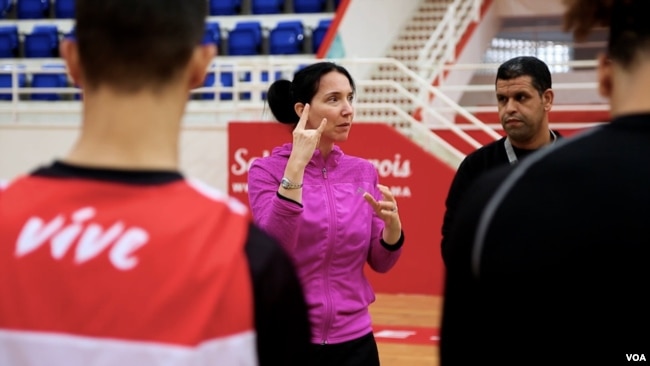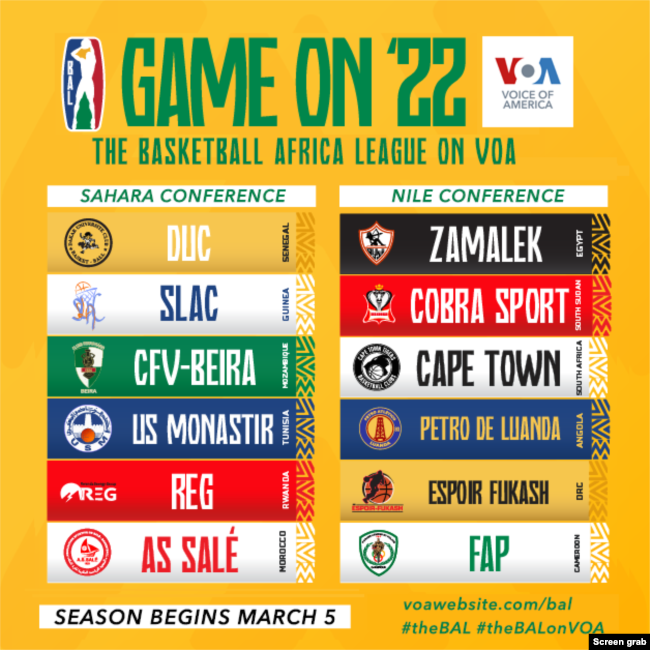

The fledgling Basketball Africa League tipped off its second season in Dakar, Senegal, Saturday, with a dozen men’s club teams from as many African countries vying for the 2022 BAL championship title.
Guinea’s Seydou Legacy Athlétique Club defeated Senegal’s Dakar Université Club 85-70 in the season opener. Both teams had their eyes on the prize claimed by Egypt’s Zamalek in last year’s inaugural season.
The COVID-19 pandemic delayed the BAL’s original 2020 launch date by a year and restricted its games to two weeks in Rwanda’s capital. This season’s 38 scheduled games will extend over three months among Dakar, Kigali and Cairo.
The BAL teams have been split into two conferences: Sahara and Nile. The Sahara teams — from Guinea, Morocco, Mozambique, Rwanda, Senegal and Tunisia – will compete against each other through March 15 at the Dakar Arena. Nile teams – from Angola, Cameroon, the Democratic Republic of Congo, Egypt, South Africa and South Sudan — will play April 9 through 19 at Cairo’s Hassan Mostafa Indoor Sports Complex. Each conference’s top four teams will qualify for the playoffs, with a single-elimination tournament and finals at Kigali Arena May 21 to 28.

The BAL is a joint venture of the National Basketball Association (NBA) and the International Basketball Federation (FIBA). It represents the NBA’s first collaboration operating a league outside North America.
“The NBA is making an investment in growing the game across the continent, broadly speaking,” NBA Africa’s president, Victor Williams, said at a February event celebrating a new NBA office in Lagos, Nigeria. Its original Africa office opened in Johannesburg in 2010.
A FIBA official said this second BAL season would “expand the scope and the entertainment value of the game” beyond the inaugural season’s two-week run in Kigali.
“Countries across Africa will see the games firsthand,” Sam Ahmedu, president of FIBA Africa Zone 3, told VOA. “It will help to also popularize the game and attract more sponsorship.”
Among BAL’s backers are companies such as Nike, Pepsi, Hennessy cognac and RwandAir.
The BAL’s parent organization, NBA Africa, has drawn strategic partners such as former president Barack Obama and investors including former NBA star Dikembe Mutombo, originally from the Democratic Republic of Congo.

While football is the continent’s dominant team sport, interest in hoops has been growing. CNBC has reported the NBA’s goal of making it a top sport on the continent within a decade, focusing on the continent’s predominantly young and growing population. Africa has the world’s youngest population, with 70% of those in sub-Saharan Africa under age 30, the United Nations reports.
This season, each BAL team will have one prospect from the NBA Academy Africa, a basketball training center in Saly, Senegal, for top high school-age prospects. It’s through a new program called BAL Elevate.
“There is a natural synergy between the BAL and NBA Academy Africa, and this program will provide another pathway for elite African prospects to reach their potential as players and people,” Amadou Gallo Fall, the BAL’s president, said in a press release.
A talent pipeline?
Right now, the NBA has more than 50 players who either were born in Africa or have at least one African parent, according to a BAL representative.
Those players include two-time MVP Giannis Antetokounmpo of the Milwaukee Bucks, raised in Greece by parents from Nigeria; Joel Embiid of the Philadelphia 76ers and Pascal Siakam of the Toronto Raptors, both native Cameroonians; and Neemias Queta of the Sacramento Kings, whose parents hail from Guinea-Bissau.
Some see efforts such as the BAL or the Basketball Without Borders program as a pipeline to the NBA. Last year’s league play drew 15 NBA scouts or team representatives, the Raptors’ scouting manager, Sarah Chan, told VOA at the time.
But other hoops devotees such as Relton Booysen contend the BAL should cultivate and keep talented players on the continent.
“My opinion is that the BAL is a prize. It is a prize for anyone in Africa, in the world, to play in the BAL,” said Booysen, head coach of the Cape Town Tigers, a South African team making its league debut April 10 in Cairo against Angola’s Pedro de la Rionda club. “It’s not like you want to use the BAL to feed players for the NBA. … I believe that the BAL will grow as big as the NBA and bigger.”
Hoops as cultural diplomacy
Scott Brooks, a sociologist and associate director of Arizona State University’s Global Sport Institute, said he sees efforts such as the BAL as a form of cultural diplomacy. “This is a global kind of community when you’re talking about basketball,” he said.
“It’s not just American culture taking over. We always get a piece of other cultures coming back,” Brooks added. “That’s what really makes this exciting.”
Brooks praised programs such as Basketball Without Borders, the NBA and FIBA’s global community development and outreach program to nurture young players — not only in the sport but also in academics, health and values.
“It’s not just building athletes, it is building leaders in Africa,” said Brooks, who also lauded the BAL’s president, Amadou Gallo Fall, for playing an instrumental role in such development. “His vision is not just that they play basketball,” Brooks said, but that “they learn servantship … and they come back to the continent and help him build it.”
Participating teams hope the BAL tournament will raise their visibility and support.
For instance, the Rwanda Energy Group (REG), which qualified for this season’s competition, is relatively unknown to Kigali resident Jean de Dieu Rukundo. “I have no idea about REG, but anyway I wish them success,” he told VOA.
REG’s sports coordinator, Geoffrey Zawadi, expressed confidence in netting new admirers. He said the 5-year-old club already has won two national league trophies and “our fan base is increasing year after year.”
VOA will partner for a second season with the BAL, broadcasting 31 games across its extensive radio network in Africa. That includes select games in English, French, Portuguese, Kinyarwanda and Wolof. New this year, VOA and the BAL will collaborate on additional programming including weekly podcasts from Dakar, Cairo and Kigali that will air across VOA and BAL online platforms. Games will be livestreamed at NBA.com and TheBAL.com.
This report originated in VOA’s Africa Division. Contributors include: Joad Jose Santarita, Portuguese Service; Edward Rwema, Central Africa Service; Yacouba Ouedraogo and Tresor Matondo, French to Africa Service; and Mike Mbonye, English to Africa Service.
https://www.voanews.com/a/basketball-africa-league-s-2nd-season-nears-tipoff-/6470579.html